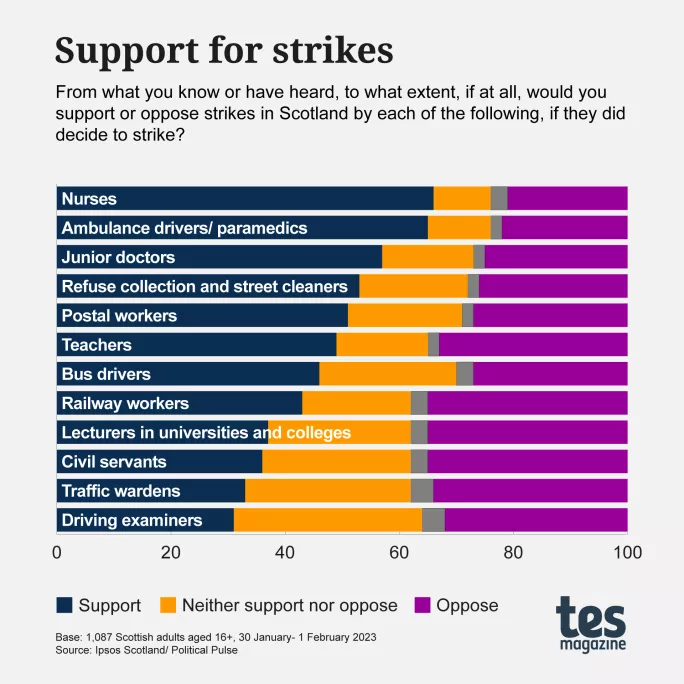Survey: More Scots support teacher strikes than don’t

As teachers in Scotland prepare for another round of strikes tomorrow, half of people in a new survey think the Scottish government has done a bad job of handling strikes - and more of the public support teachers going on strike than are opposed.
New Ipsos research conducted from 30 January to 1 February has found that just over a fifth (22 per cent) of Scots believe the government has done a good job of handling recent industrial disputes, while 50 per cent think it has done badly.
That compares to the seven out of 10 people across the UK who think the Westminster government has done a bad job of dealing with strikes - with less than one in 10 believing the UK government has done a good job of this.
When it came to the teacher strikes specifically, 49 per cent of the 1,087 Scots surveyed said they supported the action while 33 per cent said they were opposed.
There was more support, therefore, for striking teachers than for railway workers. However, current or prospective strike action from postal workers, refuse collectors and street cleaners, junior doctors, ambulance drivers and paramedics, and nurses was all looked on more favourably by the public.

Two-thirds of Scots surveyed said they would support striking nurses; 21 per cent said they were opposed. Scotland is the only part of the UK which has so far avoided strike action by NHS staff.
- Background: ‘Inadequate’ Scottish teacher pay offer rejected outright
- Related: SSTA members narrowly vote to accept teacher pay offer
- News: Teachers ‘might wish to delay’ becoming SQA markers
Emily Gray, managing director of Ipsos in Scotland, said: “With Scottish teachers about to embark on a further two days of strikes, our poll shows that more people in Scotland support than oppose this action.
“Health workers are not currently taking strike action in Scotland, but this data suggests they would have strong public support should this change.
“The Scottish public is more divided on strike action by other groups - including university and college lecturers. However, they are more likely than people across Britain as a whole to think that workers should have more power in general.”
Over half of Scots (53 per cent) say that workers have too little power, with just 7 per cent believing workers have too much power, and 32 per cent that they have about the right amount. This is higher than in Britain overall, where 38 per cent of the public say workers have too little power.
When it comes to trade unions and employers, the public’s views are more mixed. A quarter (24 per cent) believe trade unions have too much power in Scotland today, while 25 per cent say they have too little power and 36 per cent that they have the right amount. A third (32 per cent) say employers have too much power in Scotland today, while 13 per cent say they have too little power and 40 per cent that they have the right amount.
Tomorrow, Scotland’s largest teaching union, the EIS, will embark on two days of national strike action - as will members of NASUWT Scotland. The action follows the targeted strikes held for three days last week in the constituencies of “key decision makers” by the EIS, with more targeted strikes planned by the union from 7-9 March and another 20 days of rolling walkouts across Scotland’s local authorities between 13 March and 21 April.
Last week, however, the primary leaders’ body AHDS and the Scottish Secondary Teachers’ Association announced that they were withdrawing from the national strike action that begins tomorrow because their members had voted to accept the pay offer made by the Scottish government and councils on 14 February.
The offer was for a 6 per cent rise this year and a 5.5 per cent rise next year but the EIS argued teachers had effectively paid for the new deal themselves through loss of salary on strike days and rejected the offer outright.
AHDS and SSTA acknowledged that the teachers’ side of the body that negotiates teachers’ terms and conditions - the SNCT - had already rejected the offer.
In the case of the SSTA, it said if there was no improved pay offer “in the coming days” it would “reinstate” its involvement in the industrial action.
You need a Tes subscription to read this article
Subscribe now to read this article and get other subscriber-only content:
- Unlimited access to all Tes magazine content
- Exclusive subscriber-only stories
- Award-winning email newsletters
Already a subscriber? Log in
You need a subscription to read this article
Subscribe now to read this article and get other subscriber-only content, including:
- Unlimited access to all Tes magazine content
- Exclusive subscriber-only stories
- Award-winning email newsletters
topics in this article



